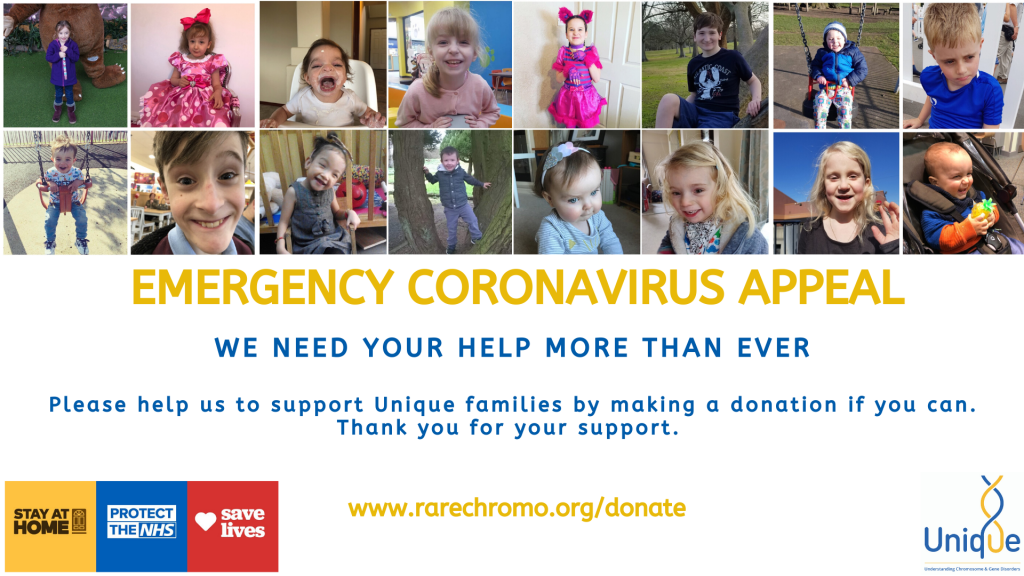14th April 2020
Below you will find some new information sheets regarding COVID19 for people with rare genetic/genomic disorders, including rare chromosome and gene disorders.
These information sheets were kindly written and produced by Dr Elizabeth Forsythe, Dr Lara Menzies, Kelly Kohut, Dr Nicki Taverner, Professor Eamonn Sheridan and Dr Frances Elmslie, on behalf of the British Society for Genetic Medicine, the Clinical Genetics Society and the Association for Genetic Nurses and Counsellors.
24th March 2020
General advice regarding Coronavirus (COVID-19) for patients with rare genetic disorders
• Includes patients with developmental disorders and undiagnosed developmental delay, rare single-gene disorders and chromosomal disorders.
• Excludes patients with severe congenital heart disease, immunodeficiency disorders or lung disease e.g. cystic fibrosis, who should follow the advice of their existing specialist advisors e.g. cardiologist, immunologist or respiratory paediatrician. If your child has a pre-existing lung or breathing problem, please seek the advice of their specialist doctor.
We understand the Coronavirus (COVID-19) pandemic is very concerning for everyone but this may be especially so for families caring for individuals with developmental disorders, undiagnosed developmental delay, rare single-gene disorders and chromosomal disorders. Coronavirus can cause severe lower respiratory tract infection in some individuals especially the elderly and those with pre-existing disorders. In general, children appear to be more mildly affected than adults but anyone with a genetic disorder that compromises their swallowing or breathing or who suffers from frequent respiratory infections or has previously been hospitalised for respiratory problems may be at higher risk. There are as yet very few data about infection rate in children. Overall the death rate is much lower than in older people.
This is a rapidly changing situation with new guidance issued regularly as things evolve. Please check NHS guidelines available here: www.nhs.uk/conditions/coronavirus-covid-19/
If you are outside the UK, please check your country’s guidelines (e.g. for the US: https://www.cdc.gov/coronavirus/2019-ncov/index.html ).
Please see the WellChild website for a clear 10 point plan and information specifically for parents and carers of medically complex children: https://www.wellchild.org.uk/2020/03/18/ten-ways-to-keep-my-child-withcomplex-health-needs-safe/. This includes a helpful link to a poster to put on your front door to advise visitors to your home of the precautions they need to take.If, at any point, you think you or your child has developed symptoms of coronavirus, such as a new, continuous cough and/or high temperature (above 37.8 °C), seek clinical advice using the NHS 111 online coronavirus service (https://111.nhs.uk/covid-19/). If you do not have access to the internet, call NHS 111. Do this as soon
as you get symptoms.
The situation is rapidly evolving but the evidence to date suggests that it would be sensible for all vulnerable , especially those with pre-existing respiratory problems or any immune-compromise, to take additional precautions to limit their exposure (eg. minimising contact with people outside their immediate family group). Please see this link for advice on social distancing and additional measures for those who may be at increased risk of severe illness from coronavirus (COVID-19).
https://www.gov.uk/government/publications/covid-19-guidance-on-social-distancing-and-for-vulnerablepeople/guidance-on-social-distancing-for-everyone-in-the-uk-and-protecting-older-people-and-vulnerableadults
Dr Helen Firth
Chair, Joint Committee on Genomics in Medicine
Dr Frances Elmslie
Chair, Clinical Genetics Society
Prof Eamonn Sheridan
Chair, British Society of Genetic Medicine
